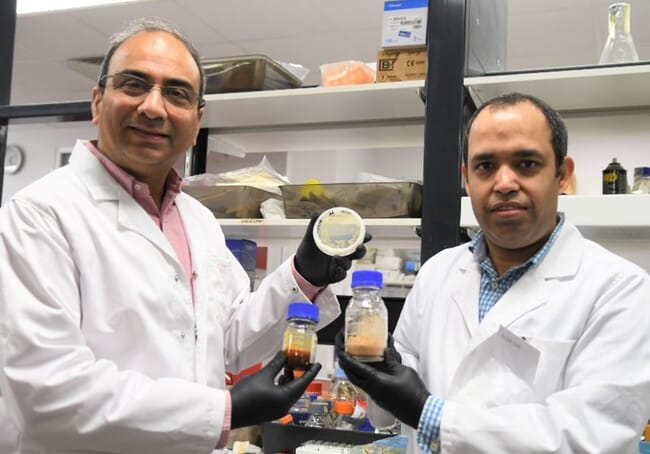
Associate Professor Munish Puri, left, and fellow researcher Dr Adarsha Gupta with locally sourced Australian microalgae in culture, and the powdered and processed material produced for biodiesel production at the Flinders bioprocessing lab. © Flinders University
New research at Flinders University has discovered a simple, low-cost and effective way to extract high-value bioactives from single-cell algal oil – using waste sulphur from industries such as petrochemical production.
The innovative process, described in the international journal ACS Sustainable Chemistry & Engineering, outlines the new method of using waste sulphur to produce enriched saturated triglycerides which can be used in applications including the production of aquafeeds.
The process uses a single reaction to simultaneously produce valuable polymers from polyunsaturated triglycerides and enrich saturated triglycerides for various value-added applications. The sulphur reaction can draw up to 90 percent of the unsaturated triglycerides from cultured single-cell algae.
“In this study, we build upon our body of work in sulphur chemistry to find an innovative way to process triglycerides from lipid-rich microalgae,” said Professor Justin Chalker in a press release.
Prof Chalker’s organic polymers have been adapted for environmental remediation, slow-release fertiliser, insulation and e-waste.
“In this case, the algae oil is reacted with sulphur. The polyunsaturated triglycerides form polymers with many established uses, such as environmental remediation. The saturated triglycerides remain unreacted in this process, for recovery and ultimate conversion to value-added substances such as biodiesel,” he said.
Associate Professor Munish Puri, from Flinders University’s bioprocessing lab in medical biotechnology, has been working on single-cell oils to produce new materials suitable for nutritional supplements, animal-free meats, biodiesel and other products.
“There is growing interest in the bio-based production of lipids from algae,” said Associate Professor Puri, who has a background in industrial biotechnology and is leading the precision fermentation platform for producing such oils.
“Single-cell thraustochytrids are especially attractive in this regard, as they can produce over 50 percent of their weight as triglycerides.
“But despite their promise, there remains a need for versatile downstream processing to enrich these so-called ‘single-cell oils’ into fatty acid classes based on degree of unsaturation. And that’s what this novel approach is helping to address.”



